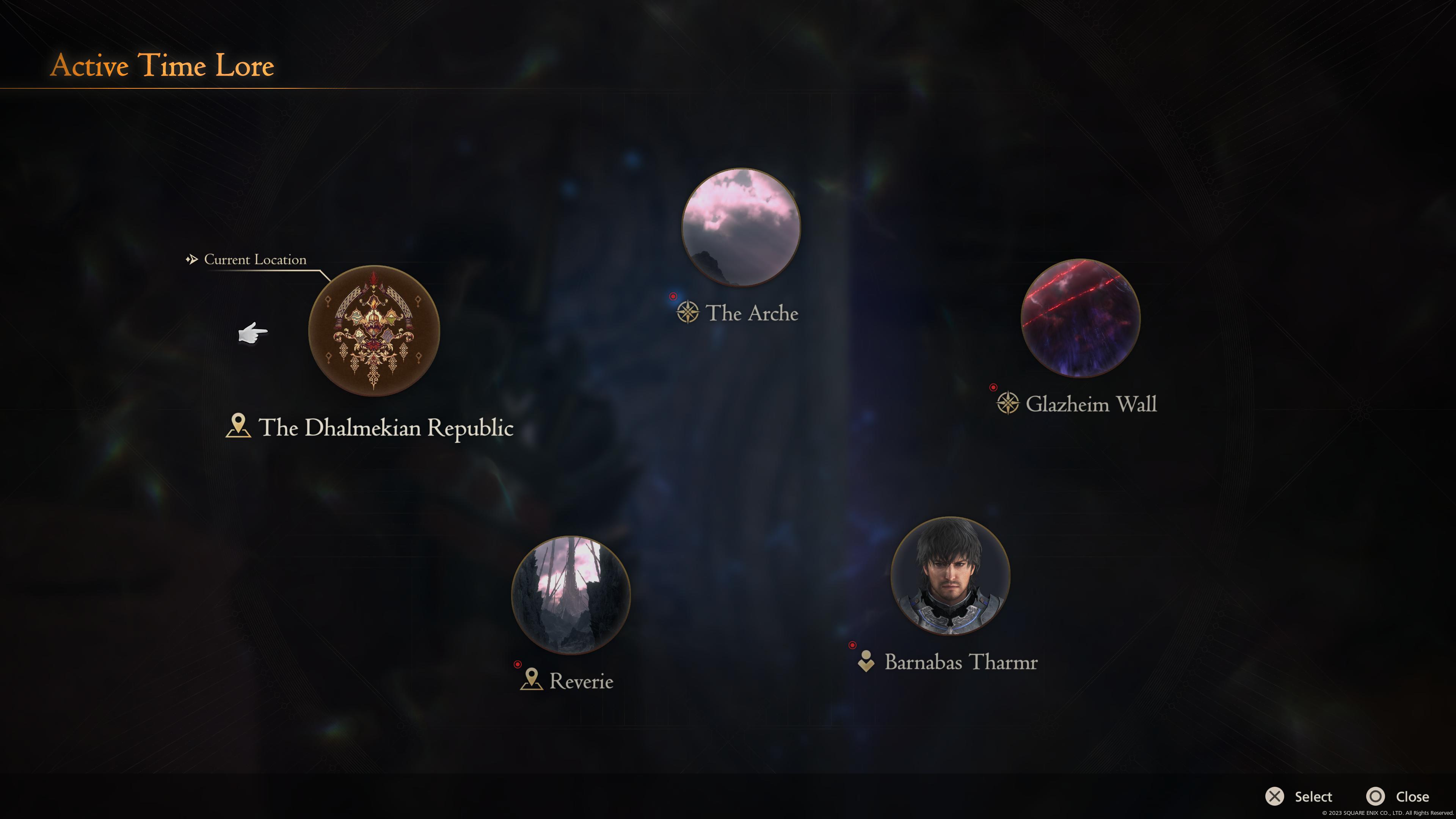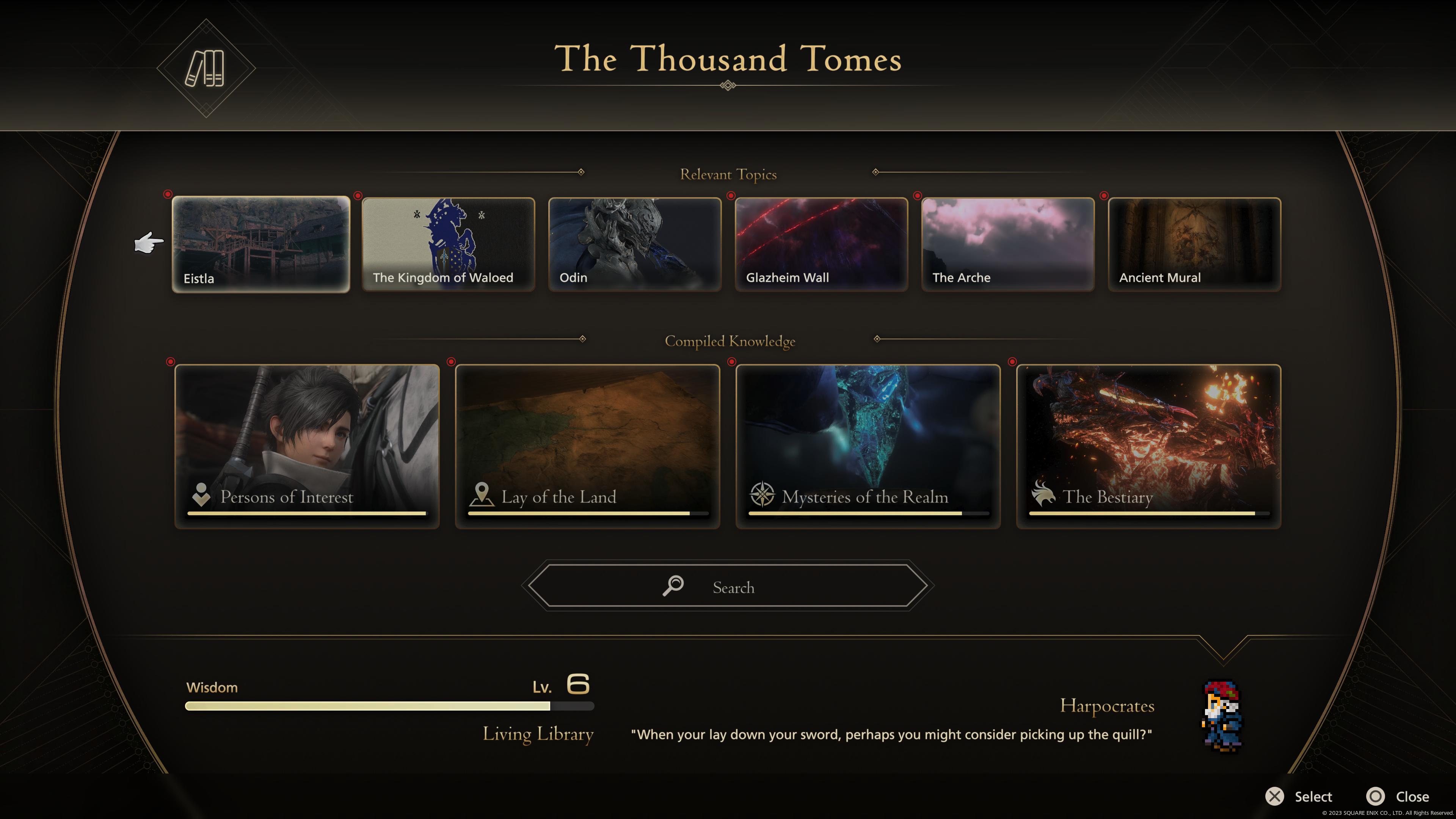I love Final Fantasy 16 — everything from its combat to its brutal storytelling makes me excited to be a gamer in the Year of the Realm 2023. It’s one of my favorite Final Fantasy games, and an RPG that’ll be near and dear to my heart forever. Not every Final Fantasy or RPG needs to be like this one, but there’s one feature that Final Fantasy 16 has that every game needs to jump on: Active Time Lore.
Active Time Lore is a feature that lets you pause in the middle of a cutscene or gameplay and display encyclopedic entries pertaining to relevant events in-game, such as persons, land and histories, mysteries of the realm, and bestiaries.
The Active Time Lore feature along with its in-narrative historian and library, Harpocrates and The Thousand Tomes, are what made me so invested in the world of Final Fantasy 16. Role-playing games are huge and, more often than not, have a ton of lore than is tough to digest at the beginning of the narrative, but I always knew where I was and what was going on in Final Fantasy 16.
Why Active Time Lore works
Active Time Lore is tricky. “Show don’t tell” is the best way to introduce your worldbuilding in any type of narrative, and exposition is the death of narrative. However, Active Time Lore is kind of cheating because you get the best of both worlds. You give all your fun “show don’t tell” story beats without diving too much into the background all while providing this neat glossary for your exposition dumping. Is it the perfect way to deliver worldbuilding? No. Is it effective? Hell yes.

In a long-winded RPG with hundreds of moving parts, you’ll bore the players by having your characters, who should already know everything, explain which country they’re in and why that’s significant. Instead, Final Fantasy 16 drops just enough information in the game to make the narrative work, but if you really want to understand where you are and what’s going on in the world itself, Active Time Lore serves that need.
I say it’s a bit like cheating because Final Fantasy 16 doesn’t do enough “show don’t tell” to immerse the viewer into the world. It operates under the assumption that we are just a spectator in a completely different world. We get the big narrative beats, but Active Time Lore plays an essential part to understanding context.
However, out of all of the RPGs I’ve played, I’ve loved this method the most. I cannot tell you how many times I practically doze off during long winded expositions, or am forced to dig up in-game books that explain the lore of the world. Active Time Lore brings all of that right to me in bits and pieces, making it more than digestible.
The best part is that if you don’t want to activate Active Time Lore to interrupt the narrative flow, anything you’ve missed will be available in The Thousand Tomes, which is the encyclopedia that Harpocrates curates in the Hideaway. After every big mission, I grab a snack and hit up Harpocrates to catch up on all the lore I missed. On top of that, when you deliver information to Harpocrates, you’re able to level up your Wisdom — with each level up you’ll gain access to new esoteric lore about Valisthea.
Adopting Active Time Lore
Every RPG that has fiefdoms, alliances and long-winded histories needs a feature like Active Time Lore. The fact that RPGs have gone so long without it is mind-boggling. No, I don’t need to know what happened in the Year of the Realm 859 in order to understand the story, but knowing that information immerses me further into the world. And that’s the goal, right? Immersion.

I can tell you all of the major story beats in the Mass Effect trilogy, but I cannot for the life of me remember half of the species or why they’re significant. Sure, RPGs like Mass Effect have glossaries you can look through to get this information, but looking at a wall of text is discouraging. Active Time Lore piecemeals that information to you in each cutscene when new relevant information comes up.
Don’t even get me started with FromSoftware games like Elden Ring — that is one of the most “show don’t tell” your players anything type-of-games in recent memory. I would desperately love an Active Time Lore feature for a Soulsborne game. I don’t want to crawl to the depths of the underworld to fight a mega super boss to talk to one NPC that’ll have two words of vague dialogue implying something wild happened there like 200 years ago.
Even The Witcher 3, which is ironically many people’s first introduction to Geralt despite being the last entry in its mega series spanning from books to the two previous games, needed an Active Time Lore system. There is so much political intrigue that it can be hard to track who’s aligned with who and who killed who’s baby. That goes double for The Witcher because of its dynamic choice-based gameplay.
Bottom line
Final Fantasy 16 is revolutionary thanks to its Active Time Lore system. It has the potential to completely change how we tell stories in RPGs. It provides developers the opportunity to let players experience their world as a citizen and not a spectator putting together their own murder board.
I hope to see the Active Time Lore system in more Final Fantasy games as well as more RPGs in the future. It can even benefit longer games that aren’t technically RPGs like Red Dead Redemption 2 or God of War Ragnarök.
Active Time Lore is the sauce that makes the Chancer’s Stew.
Back to Gaming Laptops
Source link
 notebook.co.id informasi dan review notebook laptop tablet dan pc
notebook.co.id informasi dan review notebook laptop tablet dan pc